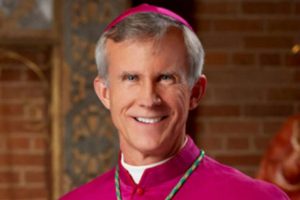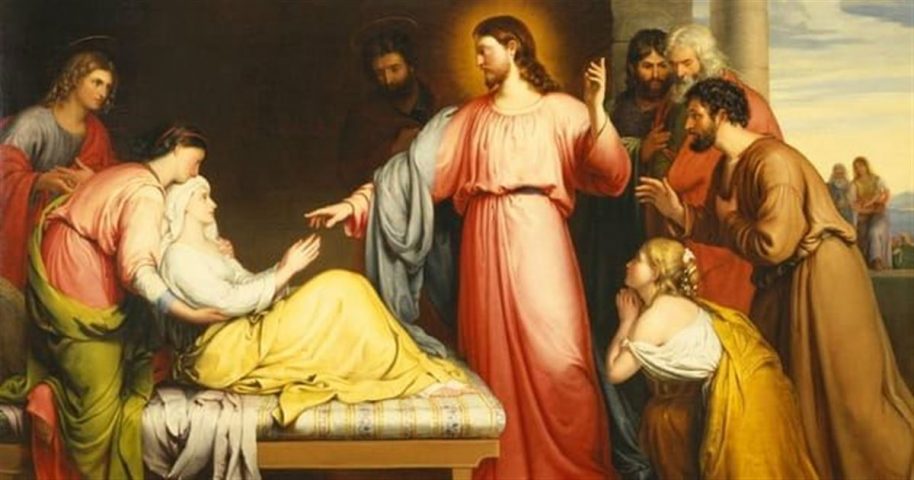Failed Coup of a Failing Establishment, by Patrick J. Buchanan
February 4, 2020Surviving Sodom, by Anthony Esolen
February 4, 2020
By Most Rev. Joseph Strickland, The Wanderer, February 3, 2020
(Republished with permission of Mr. Joe Matt, The Wanderer)

Bishop Joseph Strickland of Tyler, Texas.
In order to help the faithful to understand the effects of the sacraments, the Church, as Mother and Teacher, places the seven sacraments into three groups. The three Sacraments of Christian Initiation are linked together, Baptism, Confirmation, and the Eucharist.
We have examined all three in our past columns. Now we will consider the Sacraments of Healing and Forgiveness. There are two, Penance and the Anointing of the Sick. These two sacraments are also linked together.
The Sacrament of Penance (also called the Sacrament of Confession or Reconciliation) heals the wound of sin on the soul of the penitent and its effect on the Body of Christ. The Sacrament of the Anointing of the Sick also heals. It can bring about physical healing, if it is the Lord’s plan. It can also accelerate the healing process occurring within the believer’s own body. Finally, it can prepare the recipient for the final healing of death and entry into the new life in the presence of the Lord. In the administration of this sacrament, forgiveness of sins is also communicated.
To guard the Deposit of Faith means that the meaning, beauty, and efficacy of all the sacraments of the Church is communicated thoroughly by the teaching of sound doctrine. Further, it requires the bishops of the Church to ensure that the sacraments are properly celebrated, by the priest or bishop, in complete fidelity to the rubrics and the teaching of the Church. The faithful have a right to such administration.
These two sacraments continue the ministry of Jesus as He forgives sinners and heals the sick. As a bishop, a successor of the apostles, I am constantly overwhelmed both by the privilege of being able to administer these sacraments to the faithful and the serious obligation it places upon me.
Jesus Christ is continuing His redemptive mission, now, through His Body, the Church. After all, He is not dead, He is alive, having been raised from the dead. And, He continues His ministry through the ordained members of His Mystical Body, the Church.
We Need These Two Sacraments
The Catechism of the Catholic Church explains that “through the sacraments of Christian initiation, man receives the new life of Christ. Now we carry this life ‘in earthen vessels,’ and it remains ‘hidden with Christ in God.’ We are still in our ‘earthly tent,’ subject to suffering, illness, and death. This new life as a child of God can be weakened and even lost by sin.
“The Lord Jesus Christ, physician of our souls and bodies, who forgave the sins of the paralytic and restored him to bodily health, has willed that his Church continue, in the power of the Holy Spirit, his work of healing and salvation, even among her own members. This is the purpose of the two sacraments of healing: the sacrament of Penance and the sacrament of Anointing of the Sick” (CCC, nn. 1420, 1421).
The sections which follow in the Catechism provide excellent instruction on the origins, purpose, efficacy, and gift of these two sacraments. They are filled with references to the Bible, the Tradition of the Church, Church council documents, and great pastoral insights. They should be regularly read, reviewed, and taught by every bishop, priest, deacon, or catechist. This is why the two indispensable resources for all catechesis should be the Bible and the Catechism of the Catholic Church.
Penance is a sacrament of healing because it sets us free from the wounds of sin and makes us new and fresh. It is a continual invitation to begin again and should be encouraged regularly by bishops and priests. It is not a sacrament to be feared, but a gift to be received. And, what a wonderful gift from the Lord it truly is to those who approach it with honesty, humility, and a sincere heart.
In the last chapter of his Autobiography, entitled “The Man With a Golden Key,” G.K. Chesterton, a convert to the Catholic Church, wrote these words: “When people ask me, or indeed anybody else, ‘Why did you join the Church of Rome?’ the first essential answer, if it is partly an elliptical answer, is, ‘To get rid of my sins’.”
He continues, “For there is no other religious system that does really profess to get rid of people’s sins. It is confirmed by the logic — which to many seems startling — by which the Church deduces that sin confessed and adequately repented is actually abolished; and that the sinner does really begin again as if he had never sinned.
“When a Catholic comes from Confession, he does truly, by definition, step out again into that dawn of his own beginning and look with new eyes across the world to a Crystal Palace that is really of crystal. He believes that in that dim corner, and in that brief ritual, God has really remade him in His own image.
“He is now a new experiment of the Creator. He is as much a new experiment as he was when he was really only five years old. He stands, as I said, in the white light at the worthy beginning of the life of a man. The accumulations of time can no longer terrify. He may be grey and gouty; but he is only five minutes old.”
The Power Of The Keys
Citing powerful sermons by both St. Augustine and St. Anselm, along with passages from the Gospels and the epistles, the Catechism of the Catholic Church (nn. 527, 528), explains the “Power of the Keys”:
“After his Resurrection, Christ sent his apostles ‘so that repentance and forgiveness of sins should be preached in his name to all nations’ (Luke 24:7). The apostles and their successors carry out this ‘ministry of reconciliation,’ not only by announcing to men God’s forgiveness merited for us by Christ, and calling them to conversion and faith; but also by communicating to them the forgiveness of sins in Baptism, and reconciling them with God and with the Church through the power of the keys, received from Christ (2 Cor. 5:18):
“ ‘[The Church] has received the keys of the Kingdom of heaven so that, in her, sins may be forgiven through Christ’s blood and the Holy Spirit’s action. In this Church, the soul dead through sin comes back to life in order to live with Christ, whose grace has saved us’ (St. Augustine, Sermo 214, 11: PL 38, 1071-1072).”
In the year 1984, following a Synod of Bishops held in Rome in 1983, Pope St. John Paul II issued an apostolic exhortation on Reconciliation and Penance. It is a beautiful teaching on this great Sacrament of Freedom.
Like so much of the late Pope’s writing, this exhortation presents the biblical basis for each of his comments. It can be used as a kind of Bible Study for the Catholic or other Christian who sincerely seeks to understand this great Sacrament of Freedom and Forgiveness. I encourage my readers to engage in such a reading of this apostolic exhortation.
I want to offer a somewhat lengthy quote from this exhortation because it so clearly explains the sacrament:
“Now this power to ‘forgive sins’ Jesus confers through the Holy Spirit upon ordinary men, themselves subject to the snare of sin, namely his apostles: ‘Receive the Holy Spirit. Whose sins you shall forgive, they are forgiven; whose sins you shall retain, they are retained.’ This is one of the most awe-inspiring innovations of the Gospel!
“He confers this power on the apostles also as something which they can transmit — as the church has understood it from the beginning — to their successors, charged by the same apostles with the mission and responsibility of continuing their work as proclaimers of the Gospel and ministers of Christ’s redemptive work.”
As with all the sacraments of the Church, it is Christ Himself who is acting. Pope St. John Paul explains to his brother priests and bishops:
“Just as at the altar where he celebrates the Eucharist and just as in each one of the sacraments, so the priest, as the minister of penance, acts ‘in persona Christi.’ The Christ whom he makes present and who accomplishes the mystery of the forgiveness of sins is the Christ who appears as the brother of man, the merciful high priest, faithful and compassionate, the shepherd intent on finding the lost sheep, the physician who heals and comforts, the one master who teaches the truth and reveals the ways of God, the judge of the living and the dead, who judges according to the truth and not according to appearances.”
“This is undoubtedly the most difficult and sensitive, the most exhausting and demanding ministry of the priest, but also one of the most beautiful and consoling. Precisely for this reason and with awareness also of the strong recommendation of the synod, I will never grow weary of exhorting my brothers, the bishops and priests, to the faithful and diligent performance of ministry.”
In an age held captive by sin and deceived by the lies of the Devil, the Catholic Church offers the path to forgiveness, freedom, and new life. We need to preach and live the fullness of the Gospel of Jesus Christ. My brother bishops, priests, and deacons, we need to rediscover the evangelical joy so clearly present in the ministers of the apostolic age. We need to become first century Christians in a twenty-first century Church.
In my next column, we will discuss the two remaining sacraments, Holy Matrimony and Holy Orders. They are sacraments at the service of mission and communion.








